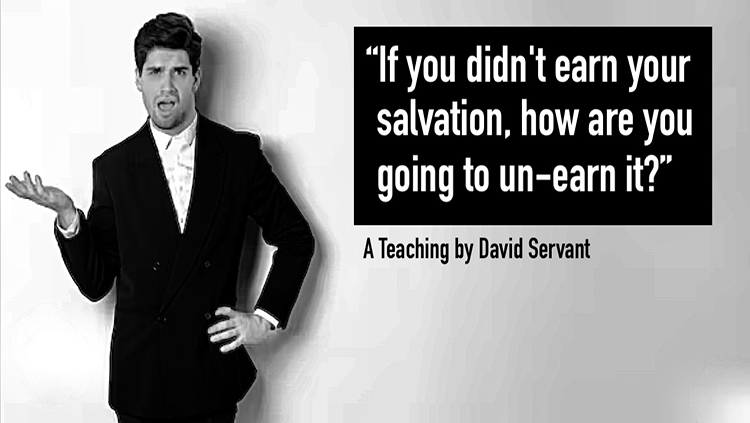
I keep seeing the question contained in the title of this article on Facebook posts. It is attributed to a well-known pastor, the late Tim Keller, and is presented as a slam-dunk proof of “unconditional eternal security” (also known as “once-saved-always-saved”).
It is to be regretted that someone as eminent and intelligent as the late Tim Keller could present such a silly question as proof for a particular doctrine when both Scripture and simple logic expose its obvious flaws.
For example, Jesus once told a parable about three servants who were all entrusted with different amounts of “talents.” None of them earned the opportunity to steward their master’s money. But the master said concerning the third servant who was unfaithful with his single talent: “Take away the talent from him, and give it to the one who has the ten talents” (Matt. 25:28, emphasis added). So, it is possible to give someone a gift that they didn’t earn and also establish a condition for them to keep what you have given to them.
Jesus once said to a man whom He had healed, “Do not sin anymore, so that nothing worse happens to you” (John 5:14, emphasis added). Obviously, the man didn’t earn his healing. But Jesus required something of him to avoid what might be worse than his former disability. So, again, it is possible to give someone a gift that they didn’t earn and also establish a condition for them to keep what you gave to them.
Jesus also told a parable about an unforgiving servant. That servant had been freely forgiven of an enormous debt by his master. Obviously, he didn’t earn his forgiveness. But he lost what he had freely gained when his master learned that he refused to forgive a fellow servant of a much smaller debt (see Matt. 18:23-35). So, again, it is possible to give someone a gift that they didn’t earn and also establish a condition for them to keep what you gave to them.
Jesus ended that particular parable by saying, “My heavenly Father will also do the same to you, if each of you does not forgive his brother from your heart” (Matt. 18:35). That’s a condition to remain forgiven. In spite of what Tim Keller thought, God can take away what He gives. Like Job said, “The Lord gave and the Lord has taken away” (Job 1:21).
There is so much biblical evidence for this simple truth that a book could be written on it. But just consider the logic of Tim Keller’s question: Have any parents ever freely given an unearned gift to one of their children but placed a condition on that child for keeping the gift? (“If you don’t take care of your new bicycle, I’m returning it to the bike store!”) Have any employers ever given an unearned job opportunity to a new employee but placed conditions on that employee to maintain his employment? Have any policemen ever given a speeding motorist a warning rather than a ticket, an obvious unearned gift, but those same gracious policemen also required slower future driving from those guilty motorists to avoid forfeiting their unearned gift? Has God ever granted someone a life on earth—a life they obviously didn’t earn—and then taken it away from them because they didn’t meet His conditions?
Since the answers to all those questions are obviously “Yes,” then not earning one’s salvation is no proof that there can’t be any conditions for keeping it. Which is why Scripture repeatedly warns of things that Christians can do to forfeit inheriting God’s kingdom (see 1 Cor. 6:9-10; Gal. 5:19-21; Eph. 5:3-5). And thank God there is always mercy waiting for the repentant while they have breath.
Becoming a Christian begins with repentance and faith in the Lord Jesus Christ. Genuine Christians are born again and set free from the power of sin. From that point on, the most important thing in their lives is serving and obeying God. God does not remove their free will or their capacity to sin, but He does empower them by His indwelling Holy Spirit to overcome sin. And He also forgives and cleanses them when they fail, if they confess their sin (see 1 John 1:9).
That is Christianity 101. If you have not experienced what I have just described, you can. It doesn’t come by “accepting Jesus” or by believing some theological facts that the devil also believes. It comes by repenting and believing in a person, the Lord Jesus Christ. If you believe He is Lord, He then becomes your Lord. If He is not your Lord, you don’t yet believe in Him. Rather, you have carved an idol and named it “Jesus.” Worse, you have believed in an antichrist of sorts, because your christ is telling you the exact opposite of what Jesus repeatedly said.
What Tim Keller was really asking was, “If you didn’t earn your salvation, how could God require anything of you in order for you to keep it?” The answer is, “That’s an absurd and illogical question that is also insulting to God. He can do whatever He wants!”
In any case, a better question to ask than the one Tim Keller posed is, “Why do so many professing Christians want a license to sin?”

